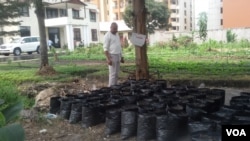Researchers say they've found evidence to help explain why farmers in Uganda and in the Democratic Republic of Congo are not adopting new agricultural technologies. Two recent studies found that samples of so-called improved seeds and fertilizer being marketed or distributed in the region were of low quality and hardly worth buying.
In most parts of the world, crop yields have increased by between three and five times in the past 40 years, but in sub-Saharan Africa they have stagnated.
Technologies such as chemical fertilizer and hybrid seeds seem to have worked wonders elsewhere. Why haven’t they produced a green revolution in Africa?
Researchers at Harvard and Stockholm Universities did field trials in Uganda on fertilizer bought from local markets and from producers. They also tested three types of seed - hybrid seed bought from producers or from local retailers, and ordinary seed farmers keep over from the harvest.
They found the fertilizer and seed from retailers was poor quality, said Tessa Bold, one of the researchers.
“We found that about 30 percent of nutrient is missing in the fertilizers and that if you buy hybrid seeds from a retailer they are about as good as if you were mixing 50% farmer seeds and 50% of properly authenticated hybrid seeds,” said Bold.
She said hybrid seeds and fertilizers bought in local markets are not really worth buying.
“We really do not know why the quality is low. Anecdotally people talk about adulteration – people take little stones and paint them to look like seed or they pour in some farmer seeds and mix them up like that,” said Bold.
VOA asked a retailer at an agro shop in Kisoro, Uganda, Mary Sebekari.
“That one I can’t answer because myself I don’t mix. Some of the seeds which I have - when they come they are packed, so there is no [way] you can mix a thing which is packed,” said Sebekari.
Another study in the D.R.C. by researcher Walter Haege, who works for a Belgian development agency, found that so-called improved varieties of maize seed were no better than farmer seeds.
“The improved seed - to my point of view – it’s an ideology. Improved seed doesn’t exist. You have to ask what are you talking about? Are you talking about a variety that has a better performance? If so, where? Because varieties always have to be adapted to certain circumstances. In the context of Congo, nobody really knows where this variety, this genetic, is really better than the local ones,” said Haege.
He added that seed storage practices in Congo are contributing to diminished performance.




